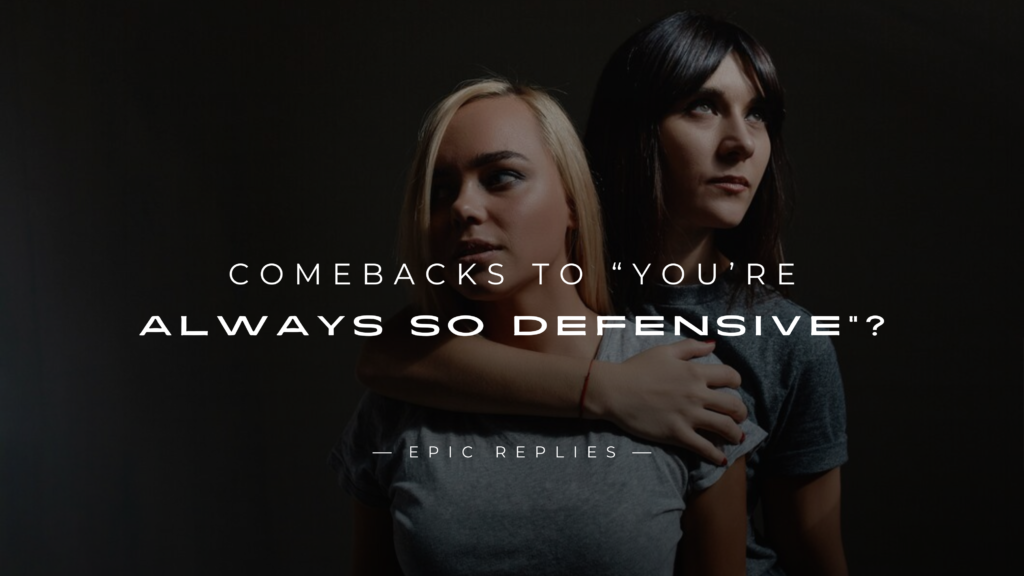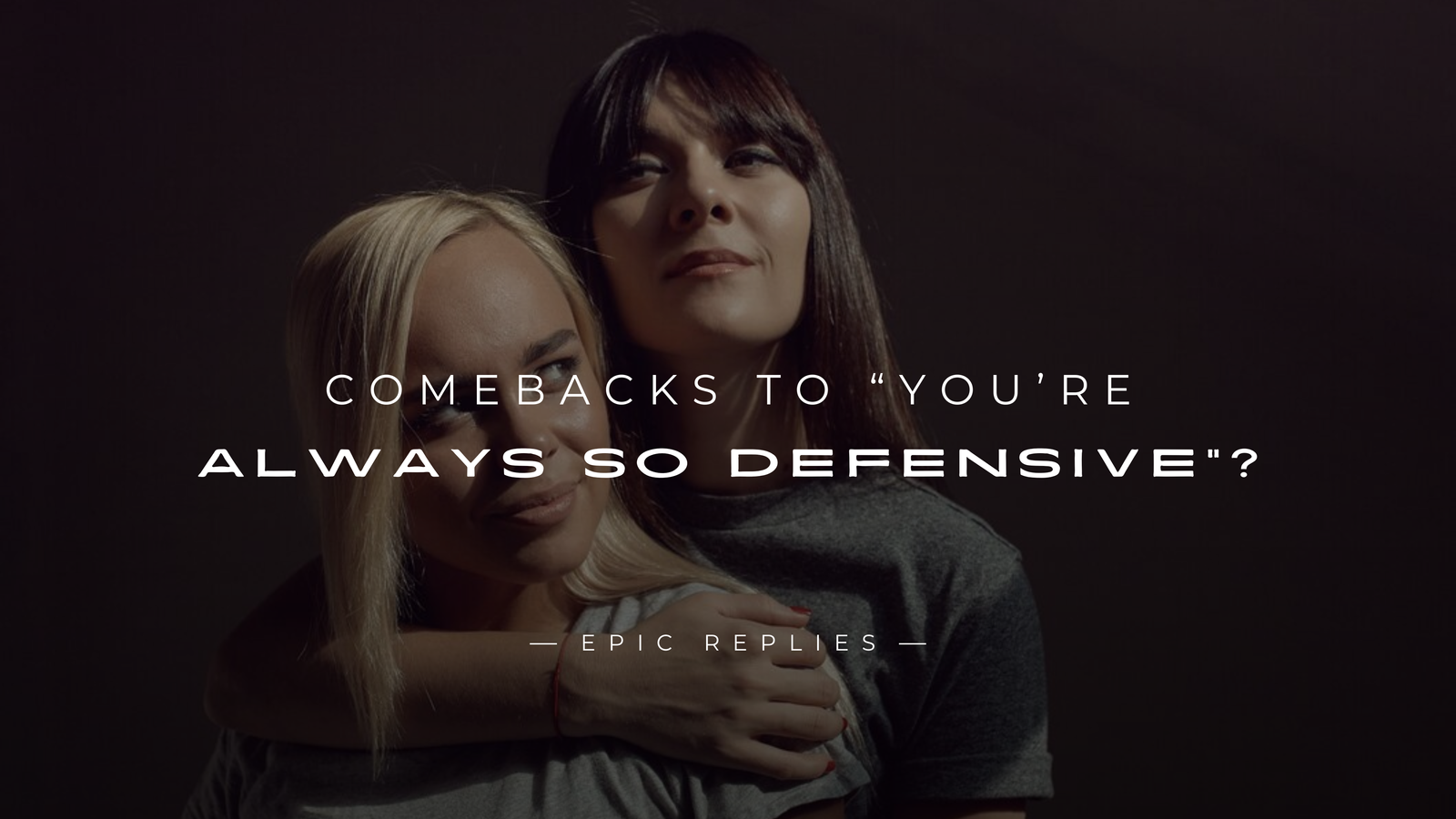Have you ever been in a heated conversation—or maybe just a slightly tense one—and someone hits you with the dreaded line: “You’re always so defensive”? Cue the instant emotional whiplash.
You freeze. You start questioning everything you just said. And worst of all, you suddenly feel like nothing you say from here on out will matter. Because if you respond, won’t that just prove them right?
That phrase can instantly hijack a conversation and throw you into defense mode, even if you were simply trying to express your perspective. But here’s the good news: You’re not powerless in that moment. In fact, you can flip the script and respond in a way that defuses the accusation while keeping your dignity intact.
This article will unpack the deeper meaning behind that phrase, explore what makes it so triggering, and offer real, effective, and even witty comebacks that you can use without sounding reactive—or robotic.

220+ Comebacks to “You’re always so defensive”?
Sarcastic
- Oh yeah, I totally woke up this morning thinking, “Let’s get defensive today!”
- Must be my fault for not applauding your every word.
- My bad—next time I’ll just agree with everything like a trained parrot.
- Wow, imagine having thoughts and expressing them. How defensive of me.
- Sure, let me just shrink into a corner and nod while you monologue.
- You’re right—I should’ve just silently accepted your wrong opinion.
- Defending myself? What a wild concept!
- Guilty of having boundaries, officer.
- Wow, sorry I didn’t just let you rewrite the script of my life.
- Oh no! Not me having self-respect again!
Playfully Confused
- Wait, I’m being defensive? I thought we were just having a convo?
- Huh? I thought I was just responding. Is that illegal now?
- I’m confused—am I supposed to just sit here like a statue?
- Hold on, am I on a debate show or something?
- Oops! Didn’t know defending myself meant I need therapy now.
- Sorry, thought we were exchanging ideas, not insults.
- Wait, wasn’t I just explaining myself?
- Dang, I thought we were vibing. My bad.
- Whoops, did I miss the “agree with everything” memo?
- Oh, so explaining my side counts as being defensive now? Noted!
Calm & Assertive
- I’m not being defensive—I’m just speaking from my perspective.
- I hear you, but I think it’s okay for me to clarify where I stand.
- It matters to me, so I’m expressing how I feel.
- I’m responding because I care, not because I’m defensive.
- I’m allowed to disagree without being labeled.
- I value honest conversations, even when they’re uncomfortable.
- I can defend my view without attacking yours.
- I’m trying to communicate, not argue.
- This isn’t defensiveness—it’s me setting the record straight.
- I’m just clarifying my position. That’s part of communication.
Reverse Uno
- Funny, calling me defensive sounds kind of… defensive.
- Isn’t labeling me like that a bit of a defense move itself?
- Maybe you’re uncomfortable with someone challenging your view.
- Interesting you say that right when I start speaking up.
- I could say the same about you right now.
- Sounds like you’re deflecting from the actual issue.
- Projection much?
- That feels more like your reaction than mine.
- You’re calling me defensive while dismissing everything I say—ironic.
- Are you labeling me that way to avoid what I’m actually saying?
Humorous
- Me? Defensive? Never! My inner knight just likes a good joust.
- You’re right—I should’ve let you monologue unchallenged.
- I’m not defensive, I’m just allergic to nonsense.
- I’d agree, but then we’d both be wrong.
- Defending myself is just my way of staying entertained.
- Oh no! My sarcasm slipped out again!
- Defensive? Nah, I just have a strong personality.
- My therapist says I’m perfect, so clearly, you’re mistaken.
- I’m not defensive. I just enjoy making strong rebuttals.
- You try staying quiet when someone’s rewriting your life story!
Logical/Analytical
- Being called defensive often shuts down valid responses.
- It’s natural to explain oneself when misunderstood.
- Isn’t it reasonable to defend a position I believe in?
- Could it be that you’re interpreting disagreement as defensiveness?
- I’m providing context, not reacting emotionally.
- My tone may seem defensive, but my intent is to clarify.
- What makes you think defending a viewpoint is negative?
- This sounds more like a communication gap than defensiveness.
- It’s not defensiveness—it’s active engagement.
- There’s a difference between explaining and reacting.
Empathetic
- I hear that it sounds defensive to you—thank you for being honest.
- I’m not trying to push back—I just want to feel understood.
- I care about this, so maybe I’m coming across more intense than I meant to.
- I can see how my tone might feel that way to you.
- My reaction’s not perfect, but it’s coming from a place of trying to connect.
- This is important to me, and I want us to understand each other better.
- I respect how you feel—I just want to explain where I’m coming from too.
- I appreciate you pointing that out—I’ll think about how I’m saying things.
- Maybe I am being a little defensive—it’s something I’m working on.
- I don’t want this to turn into a wall between us—I’m open to hearing you.
Intellectual Challenge
- What definition of “defensive” are you using here?
- Let’s unpack what’s actually going on instead of labeling reactions.
- Can we examine why that word came up instead of exploring what I said?
- Do you think that calling someone defensive might shut down dialogue?
- What’s the difference between being defensive and being passionate?
- Are we open to multiple viewpoints here, or only yours?
- Is there room for disagreement in this conversation?
- Let’s challenge the assumption that disagreement equals hostility.
- Could it be you’re expecting agreement rather than discussion?
- What outcome do you want from calling me “defensive”?
Blunt & Honest
- I’m being defensive because I feel like you’re not hearing me.
- Yeah, I’m defensive—because I’ve had to defend myself too often.
- Maybe I am. This matters to me.
- I don’t like being misrepresented, so yeah—I’m responding strongly.
- Honestly, I’m tired of being dismissed.
- It’s not just defensiveness—it’s frustration.
- I react because I care. That’s not a weakness.
- If I don’t stand up for myself, who will?
- I don’t owe silence just to keep the peace.
- Call it defensive if you want—I call it speaking my truth.
Polite but Firm
- I respect your perspective, but I think it’s fair to explain mine too.
- I hear what you’re saying, but I’d like space to express myself.
- I’m not trying to be difficult—I’m just trying to clarify where I stand.
- That’s not my intention at all, but I understand how it could feel that way.
- I don’t see it that way, but I’m open to hearing more.
- I think it’s okay to stand up for myself when something doesn’t sit right.
- I’m not attacking—I’m responding thoughtfully.
- I’m open to feedback, but I also have a right to express myself.
- I want us to communicate honestly, and that includes both of us being heard.
- Let’s not confuse assertiveness with defensiveness.
Disarming
- I can see how it might come across that way—wasn’t my goal.
- If it helps, I’m not upset—I just wanted to explain myself.
- I’m actually just trying to stay present in the conversation.
- That wasn’t meant as a defense—just a little insight into how I see it.
- I’m not mad—I’m just a bit passionate about this topic.
- I’m sorry if I sounded defensive; I’m really trying to listen.
- No worries, I’m here to understand you better too.
- I didn’t mean to shut you down, just sharing my side.
- Let’s keep talking—I don’t want this to feel tense.
- Thanks for pointing that out; I’ll try to be more open.
Self-Deprecating
- Yeah, my defense mechanism is apparently set to “full throttle.”
- I guess my inner guard dog never takes a break.
- Defensive? Guilty as charged. Can’t help it.
- Maybe I should take some lessons in “chill.”
- Hey, at least I’m consistent!
- My therapist says I’m working on it… slowly.
- I’m basically a walking contradiction of “keep calm.”
- I should probably get a hobby that isn’t arguing back.
- Defensive? Nah, just passionate with a side of stubbornness.
- I swear I’m nicer on my good days.
Redirecting
- Let’s not get stuck on labels—what’s the real issue here?
- Instead of focusing on how I react, can we talk about what’s bothering you?
- I’d rather solve the problem than argue about how I’m responding.
- What do you want to change here? That matters more to me.
- Can we move past that and focus on finding a solution?
- I’m more interested in understanding your point than defending myself.
- Let’s get back to what this is really about.
- Can we put that aside and figure out what’s next?
- It feels like we’re going in circles—how about we reset?
- What’s more important: how I’m acting or what we’re trying to fix?
Therapist Mode
- When you say I’m defensive, what feelings are coming up for you?
- It sounds like there might be some frustration underneath that comment.
- Let’s explore what triggers these moments for both of us.
- I wonder if this is about feeling unheard on both sides.
- What do you think makes you say I’m defensive?
- I’m curious—what would feel different in this conversation?
- Sometimes defensiveness is just a shield; what’s it protecting here?
- How can we create space where we both feel safe to speak?
- It seems like there’s more beneath the surface—want to talk about it?
- I’m open to understanding what’s really behind your words.
Mic Drop
- Defensiveness? Or just refusing to let nonsense slide?
- If standing up for myself is being defensive, so be it.
- Sorry, I don’t do “silent acceptance.”
- Better defensive than indifferent.
- I’m just protecting my truth—deal with it.
- You want quiet? I bring honesty.
- Call it defensive; I call it self-respect.
- If that’s defensive, I’m fluent.
- I’m not defensive—I’m awake.
- This isn’t a flaw, it’s a feature.
Agree & Amplify
- You’re right—I’ve got a PhD in being defensive, actually.
- Totally! I’m training for the Defensive Olympics next year.
- Defensive? I’m thinking of trademarking it as my superpower.
- I’m so defensive, even my shadow argues with me.
- Yeah, I’m defensive, and proud of it! Want some tips?
- Defensive? Please, I’m a master at it.
- I’m basically a walking, talking defense system.
- Defensive? Nah, I’m just allergic to nonsense.
- You think that’s defensive? Wait till you see my sequel.
- I’m so defensive, I charge admission.
Zen
- I’m simply responding with awareness, not defensiveness.
- Peace comes from understanding, not silence.
- I’m here, present, and honest—that’s all.
- Let’s breathe and listen without judgment.
- I respond from a calm place, even if it doesn’t look like it.
- Defense fades when there’s clarity.
- I trust this conversation can hold space for all feelings.
- I’m grounded in my truth, open to yours.
- Sometimes, clarity requires gentle defense.
- My calm doesn’t mean I won’t speak up when needed.
Question Back
- What makes you say that I’m defensive?
- Can you tell me what I said that felt defensive?
- How would you describe what I’m doing instead?
- What’s your definition of being defensive?
- When did you start noticing this about me?
- Are you sure it’s defensiveness or just disagreement?
- What would you prefer me to do instead?
- How does me being “defensive” affect you?
- What’s the outcome you want from this conversation?
- Is it possible you’re feeling defensive too?
Mildly Passive-Aggressive
- Oh, thanks for the unsolicited personality analysis.
- That’s a cute observation coming from you.
- Defensive? Wow, you really have me all figured out.
- I’m defensive? Interesting—tell me more about your expertise.
- Glad you’re keeping track of my personality quirks.
- Must be exhausting having to notice everything I do.
- You’re right, I should check with you before reacting.
- Thanks for your concern, Dr. Feelings.
- I’ll add that to my list of things to pretend I care about.
- Cool story. Want to tell it again?
Friendly Challenge
- Could it be that you’re uncomfortable with disagreement?
- What if I’m just passionate, not defensive?
- How would you react if the roles were reversed?
- Why does speaking up feel like a problem to you?
- Is it possible you’re expecting agreement, not conversation?
- Can we explore what makes you say that?
- What would a non-defensive response look like to you?
- Could it be you’re mistaking assertiveness for defensiveness?
- I’m curious—how do you handle it when you disagree?
- Let’s figure out why this keeps coming up between us.
Direct Reframe
- I’m not defensive—I’m being clear and honest.
- That’s not defensiveness; it’s standing up for myself.
- What you’re calling defensive is just me setting boundaries.
- I’m not reacting out of fear—I’m reacting out of respect for myself.
- It’s not defensiveness—it’s engagement.
- I’m not shutting down; I’m speaking up.
- That’s not defensiveness; that’s passion.
- I’m not avoiding your point—I’m addressing mine.
- I’m not defensive; I’m intentional.
- This isn’t a flaw—it’s my way of protecting what matters.
Deadpan
- Defensive? Wow, what a groundbreaking insight.
- Thanks, Captain Obvious.
- Oh no, not the dreaded defensiveness again.
- Sorry, I’ll work on my “agree with everything” skill set.
- Defensive? I thought I was just talking.
- Good to know you’re keeping score.
- That’s an original observation. Really.
- Wow, you should write a book on this.
- I’m defensive, you’re impatient—teamwork!
- Thanks for the update. I’ll add it to my memoirs.
Understanding the Accusation
- The Psychology Behind Defensiveness
Let’s start with the science. Defensiveness isn’t just an attitude—it’s an automatic neurobiological response. When you feel attacked, your brain kicks into survival mode. The amygdala (your brain’s alarm system) lights up, and suddenly, logic takes a backseat. Your priority becomes: protecting yourself.
This is especially true if the person accusing you is someone close—a partner, friend, sibling, or even a co-worker you see daily. Why? Because the higher the emotional stakes, the more intense our reaction can be.
So when someone says, “You’re always so defensive,” they might be responding to your emotional armor—but ironically, they’ve just triggered more of it.
- Is It Really About You?
Now here’s where things get interesting.
Sometimes the person calling you “defensive” is actually the one avoiding responsibility. Instead of addressing your valid concerns, they flip it back on you.
This is called projection.
Let’s say you say, “I felt hurt when you didn’t text me back,” and they respond, “You’re always so defensive.”
See what happened? You expressed a feeling. They couldn’t handle it. So they shifted the focus from their action to your reaction.
This tactic deflects attention and keeps them in control of the narrative. Understanding this doesn’t mean you attack them in return—but it does help you step back and say, “Wait a second… is this really about me?”
The Problem With the Phrase “You’re Always So Defensive”
- Labeling vs. Listening
Calling someone “defensive” is a judgment, not an observation. It’s like saying, “You’re always difficult,” or “You’re overreacting.”
These are labels—and labels shut down meaningful conversation.
Instead of exploring why someone responded a certain way, it dismisses them with a single word. You don’t just feel misunderstood—you feel silenced.
People rarely change when they’re labeled. But they do grow when they’re heard.
- The Emotional Trap
The real kicker? Once someone drops that line, anything you say afterward can look like… well, more defensiveness.
It’s a no-win situation unless you know how to navigate it carefully.
It’s like someone saying, “You’re being too sensitive,” right after you express hurt. It’s invalidating. It makes you doubt yourself. And in some cases, it’s a subtle form of gaslighting—manipulating you into questioning your emotional reality.
But with the right tools and mindset, you can avoid falling into that trap and respond with calm authority.
How to Handle the Accusation Gracefully
- Stay Calm and Centered
Here’s your first secret weapon: the pause.
Before you say anything, take a moment. Breathe. Ground yourself.
Literally—feel your feet on the floor. Relax your jaw. Slow your breathing. This small pause helps your brain shift from fight-or-flight mode back into a state where logic and emotional intelligence can guide your words.
Think of it as reclaiming your power before handing over a response.
- Clarify What They Mean
A brilliant way to take control without confrontation is to get curious. Ask, “Can you tell me what I said that felt defensive to you?”
This does two things:
- It puts the burden of clarity back on them. Now they have to reflect on what specifically triggered them.
- It invites dialogue instead of drama. It signals you’re open to understanding—not just defending yourself.
It also exposes vague criticism. If they can’t answer, maybe there wasn’t a good reason behind their comment.
- Validate, Then Respond
This doesn’t mean you agree. But showing you understand how they feel gives you credibility.
You might say:
“I see how it might have come across that way. That wasn’t my intention—can I explain what I meant?”
This combo of validation + explanation is powerful. It neutralizes their tension while giving you a chance to share your perspective.
Best Comebacks to “You’re Always So Defensive”
Calm and Clever Responses
- “That sounds like a conclusion. Can we talk about what led you to feel that way?”
- “I hear you. It matters to me that we understand each other—can we slow down and revisit what I said?”
Lighthearted or Witty Replies
Humor can diffuse tension like nothing else. Use it wisely.
- “Me? Defensive? I prefer the term ‘passionately misunderstood.’”
- “Guess I must’ve built some emotional armor—wasn’t expecting a sneak attack.”
- “Okay, maybe I’m defensive—but have you heard your tone?” (with a smile!)
Reflective Comebacks
- “I want to be open with you, but it’s hard when I feel labeled. Can we talk about what’s really going on?”
- “Let’s not focus on how I’m reacting—let’s focus on what we’re both trying to say.”
How to Avoid Sounding Defensive (Even When You’re Not)
Watch Your Tone and Body Language
Sometimes it’s not what you say—but how you say it.
Avoid:
- Eye rolling
- Arms crossed
- Speaking louder or faster
Instead:
- Keep a relaxed posture
- Use a calm, steady voice
- Make gentle eye contact
Your nonverbals can reassure the other person that you’re not attacking—even if your words challenge their view.
Speak From “I” Not “You”
Try this:
- ✅ “I felt overwhelmed when that happened.”
- ❌ “You never listen to me.”
“I” statements keep things grounded in your experience, not assumptions. That’s less likely to trigger the other person—and more likely to be heard.
Pause Before Reacting
If someone says something that instantly riles you up, pause. Even a 3-second delay can mean the difference between regret and resolution.
Think of it like emotional buffering.
Turning Conflict Into Connection
- Empathize to Diffuse Tension
When you reflect someone’s emotion, it helps them feel seen.
Try:
“It sounds like you’re feeling unheard. Is that what’s happening here?”
Even if you disagree, showing empathy invites co-regulation—a calming effect created by mutual emotional presence.
- Set Boundaries Without Blame
Sometimes you need to protect the conversation from spiraling.
Say:
“I’m open to continuing this, but let’s both try to stay curious instead of jumping to conclusions.”
Or:
“Let’s pause and come back to this when we’re both in a better headspace.”
Boundaries ≠ conflict. They’re the scaffolding for healthier communication.
When to Walk Away or Set Firm Limits
Recognizing Toxic Communication Patterns
If every disagreement turns into “you’re too defensive,” it might be emotional manipulation.
Watch for:
- Repeated blame-shifting
- Gaslighting
- Passive-aggressive behavior
If it happens often, it’s not a communication problem—it’s a power dynamic issue.
Protecting Your Peace
You have the right to say:
“This conversation isn’t healthy for me right now. Let’s revisit it later.”
You’re not walking away because you’re weak. You’re walking away because your peace matters more than winning.
Conclusion
No matter how often you hear “You’re always so defensive,” having a sharp, thoughtful comeback can help you stay calm and confident in any conversation. These 220+ responses offer a mix of humor, wit, and assertiveness to suit every situation, empowering you to handle criticism without losing your cool. If you want even more clever ways to stand your ground, check out our 220+ Comebacks to “You Can’t Handle the Truth” for additional sharp replies that will keep you in control of the dialogue.
FAQs
Q. What triggers someone to say, “You’re always so defensive”?
Usually, it stems from frustration or feeling unheard. But sometimes, it’s a projection of their defensiveness or an attempt to avoid accountability.
Q. How can I stop being defensive in arguments?
Focus on staying calm, using “I” statements, and listening to understand, not to reply. Awareness is the first step toward control.
Q. Is being called defensive a form of manipulation?
It can be. If it’s used repeatedly to silence you or derail your concerns, it may be a form of emotional manipulation or gaslighting.
Q. What are the signs that someone is projecting onto me?
If the person is accusing you of behaviors that they are showing—or if their accusations feel exaggerated or out of context—it may be projection.
Q. How do I express my point without sounding defensive?
Stay calm, use reflective language, avoid aggressive tone or gestures, and focus on collaborative problem-solving rather than proving a point.




